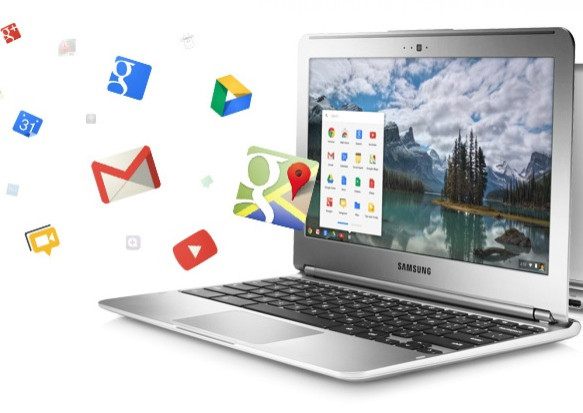Google, Samsung Introduce 2012 Chromebook: Why Price, Not Specs, Is King [VIDEO]

A little more than a year after Google, Acer and Samsung introduced the Chromebook in June 2011, the search giant announced a brand-new Chromebook at a media event in San Francisco on Friday, which starts at the extremely competitive price of $249.
Besides being $200 cheaper than its predecessor, the third-generation Chromebook from Samsung is the lightest, thinnest and most powerful Chromebook ever built, boasting a battery life of more than 6.5 hours and a fast 1.7GHz dual-core Exynos processor from Samsung, an upgrade from the 1.3GHz dual-core Celeron processor from Intel.
The new Chromebook, as Google advertises, is the $249 laptop “for everyone.”
“As a kid growing up in India, I was fascinated with computers and the endless possibilities they presented,” Sundar Pichai, Google’s senior VP of Chrome and apps, said in a company blog post on Friday. “I had to wait until college to finally get my hands on one in the computer lab and since then began dreaming of a world where everyone could have access to one. We’re not quite there yet, but every day we get a bit closer.”
Pichai said that for many families, the 11.6-inch Chromebook is the “perfect additional computer” for kids who want to do their homework on the couch or for parents who want to check emails or stay connected on video chat while in the kitchen.
“This gets to the heart of the Chromebook vision,” Pichai said. “In order to have one, two or more computers around the house, they need to be easy to use and much more affordable. So together with Samsung, we designed a new laptop -- the new Samsung Chromebook for $249 -- the computer for everyone.”
For those that have never owned a Chromebook, Google’s proprietary laptop essentially runs one program: Google Chrome, the company’s Web browser. However, with the entire Internet at one’s disposal, as well as a few added features like 100 GB of free storage on the company’s cloud service, Google Drive, the Chromebook has most of the basic features computer users need.
Word processing? Try a Google Document. Mail and chat services? Try Gmail, Google Chat and Google Hangouts. For almost everything you need in a computer, there’s a viable Internet-based solution. And that’s exactly what Google is banking on in the Chromebook.
“Even with its compact design, it’s packed with performance -- it boots up in less than 10 seconds and resumes instantly,” Pichai wrote on Google’s blog. “High-resolution videos (in 1080p) are beautiful to watch, and, when using the touchpad, you’ll notice smooth scrolling due to a hardware-accelerated user interface. And as you'd expect from a Chromebook, it’s easy to share with others. Everyone -- mom, dad, grandparents, tech lovers, tech haters -- can have separate accounts where all of their stuff is kept safe. Finally, if you’re an active Google user of products like Gmail, Drive, Search, Maps, YouTube, Play or Google+ Hangouts, everything just works seamlessly.”
Chromebook’s Killer Feature: The Cost Of Entry
Internet users who frequently work outside of Wi-Fi zones may want to consider purchasing a 3G-capable version of Google’s new Chromebook, which includes 3G service from Verizon Wireless with up to 100MB of data per month for two years. Amazon sells this model at $330. If this is the most expensive Chromebook available, Google’s new laptop has already won.
With the exception of Apple, many companies fail to realize that price is the ultimate barrier to a product. And even compared with Apple’s “everyday notebook,” the equally sized 11.6-inch MacBook Air, Google’s new Chromebook is substantially cheaper. Customers who choose the Chromebook over the MacBook Air would save anywhere between $750 and $1,169; for that money, users could buy a Chromebook, as well as an iPad, or a Microsoft Surface or even a cheaper MacBook Air.
In the same way that Amazon and Barnes & Noble realized they struck gold when they introduced tablets at the magic $199 price point, Google and Samsung have realized that laptops can work the same way. Now that most of the wanted laptop features are all based in the cloud, Google and Samsung can afford to release a bare-bones laptop that simply offers the Internet. After all, if anyone knows the power of the Internet, it’s Google.
As JR Raphael of ComputerWorld points out, the Chromebook is not for everyone, but there are several advantages to the Chromebook over traditional laptops, including the elimination of manual application updates and virus protection and the added benefit of universal syncing across Google apps. And even when those issues eventually arise in the Chromebook, such as the lag reported with resource-intensive Web apps or having too many tabs open, the problems are significantly easier to digest when you remind yourself that you only paid $250 for a fully functional laptop.
Samsung is also still selling its higher-end Chromebook, released in May, the Samsung Chromebook 550, for $449. It comes with built-in 3G and 12 free sessions of Gogo in-flight Internet.
© Copyright IBTimes 2025. All rights reserved.






















